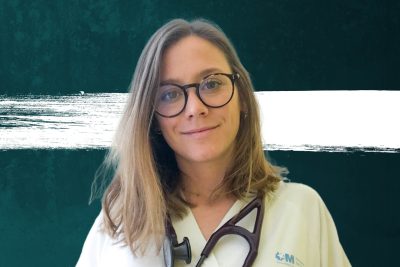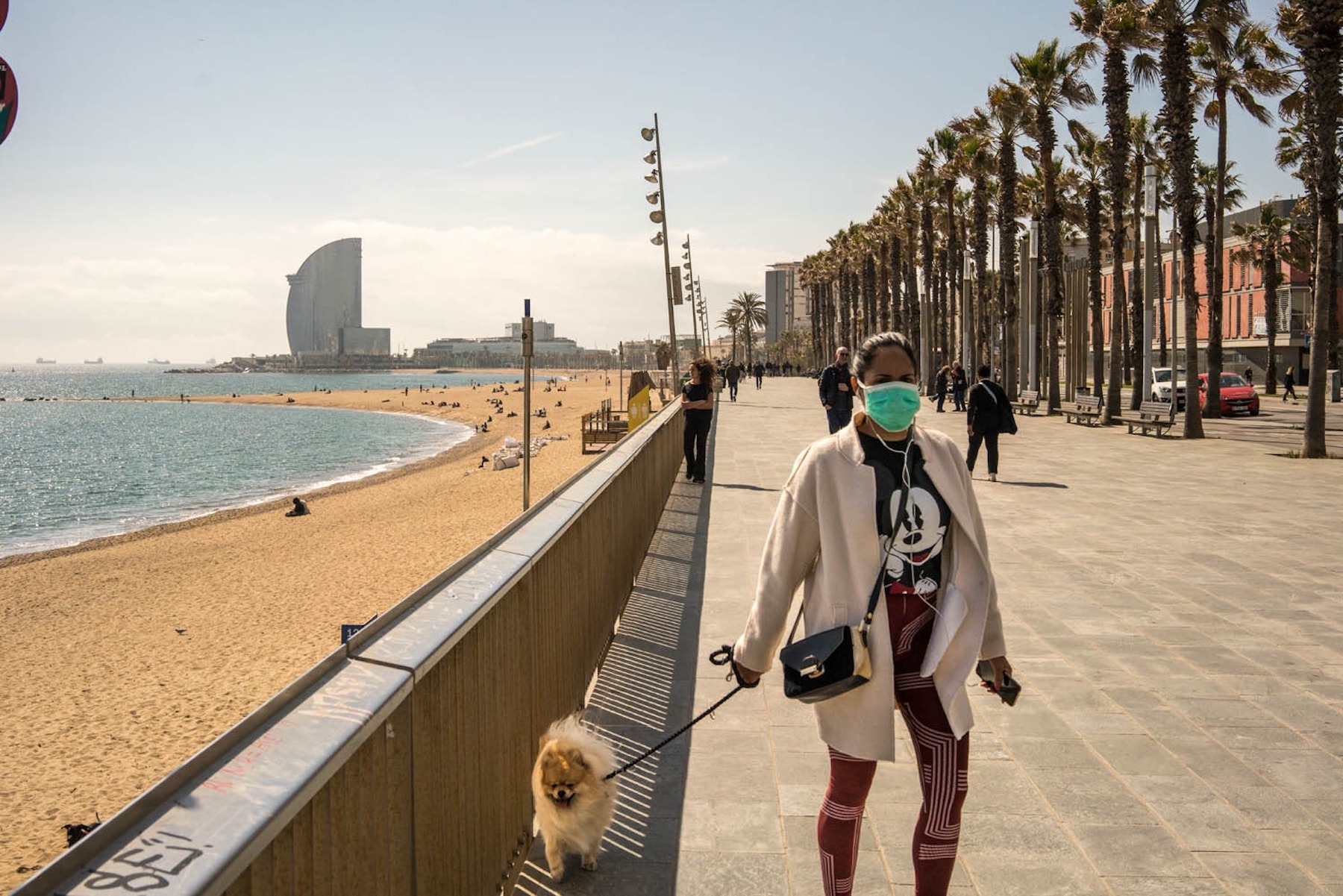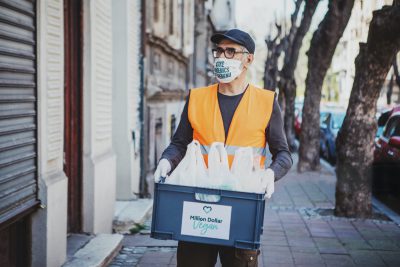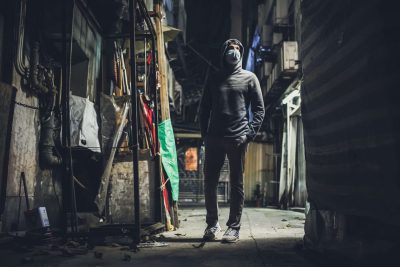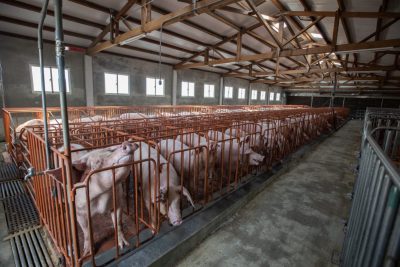Doctor Natalia Vicente is a doctor of internal medicine in the Hospital Sureste de Madrid. As a researcher, she has participated in more than 15 studies and regularly speaks at epidemiology conferences. Here, she talks to us about the public health risks of antibiotic resistance the the coronavirus, and how eating a vegan diet helps.
Dr. Vicente, what is the situation you are currently seeing in the hospital?
We’re facing a pandemic and resulting public health crisis of proportions never before seen in our public health system. At first there were just a few of us in the “Covid” team, but as time went on we saw the virus colonize the whole hospital, and absolutely all the staff have adapted to carry out different tasks, all related to patient care.
The disease has forced us to be as dynamic as possible, since some of our workmates are falling ill we have to take on their duties too. If I could single out something as being most important, it would be the willpower of the workers; the huge camaraderie, effort and sacrifice that each and every one of the staff is giving. In spite of everything, the physical burden is important, but the emotional one even more so. I have no doubt that with the passage of time this shared experience will leave its mark on us.
Could future pandemics be avoided if we stopped eating animals?
It’s difficult to say with certainty that if we stopped eating animals, all zoonotic pandemics would disappear, but I’m totally convinced that the probability of one occurring would at least be considerably reduced. Covid-19 is the third pandemic produced by the Coronavirus in the short time we’ve been in the 21st century. The three of them (SARS, MERS and COVID-19) all originated due to the virus jumping between different animal species including humans. Avoiding 100 percent of interspecies interaction is impossible, but intensive animal husbandry, or factory farming, live animal markets and the invasion of natural habitats increases this interaction dangerously, and therefore raising the risk that new mutated viruses will make the jump to humans, unleashing new pandemics.
We have previous experience such as bovine spongiform encephalopathy (BSE or mad cow disease) when ingestion of infected animal products was the direct cause of infection in humans. The origin of the current SARS-COV2 outbreaks seems to be located in a fish and seafood market in Wuhan, China and the suspected wild host is the bat, although we still don’t know if there was direct transmission or if an intermediate host such as serpents, pangolins or turtles were involved.
Could a 100% plant-based diet help in the treatment of any illnesses, or even reverse them?
Cardiovascular diseases are a direct consequence of lifestyle and diet, both of which are totally avoidable if one acts consistently. A plant-based diet has been demonstrated, through numerous studies, to improve cardiovascular health and diminish the incidence of hypertension, diabetes, ischemic cardiopathy and even some cancers. Furthermore, thanks to studies carried out in China, we know that arterial hypertension and diabetes mellitus are two diseases that worsen the outlook of Covid-19 patients, increasing fatalities. Moreover, we mustn’t forget that, outside the current situation, cardiovascular diseases constitute the primary cause of death worldwide.
Could you explain what antibiotic resistance is and how it occurs?
Antibiotic resistance is usually acquired through mutations in the DNA of bacteria, which occur when a certain microorganism is pressured by an antibiotic in a certain way over time. To say it more clearly, the bacteria “learn” to develop mechanisms that allow them to escape from the antibiotic that’s trying to kill them. On some occasions it’s also possible that bacteria transfer antibiotic resistant genes horizontally between each other.
These mutations are very complex and act on different levels: they can expel the antibiotic once inside the bacteria, or reduce the antibiotics’ ability to penetrate to the interior of the bacteria, or even directly modify the antibiotics’ action. Logically, the more we use them, the more pressure we put upon these bacteria, and what happens is that it becomes more likely that a mutation is produced, and antibiotic immunity is generated.
The WHO [World Health Organization] has been alerting us to the serious nature of this problem and has predicted the possible arrival of a ‘post-antibiotic era‘ in which common infections and minor injuries could again prove to be fatal in the face of the ineffective antibiotics that we currently use.
How could a plant-based diet combat antibiotic resistance?
Some mutations that bestow resistance are produced by random natural mutations in nature, but of course the abuse of antibiotics throughout the 20th century increases this process exponentially.
The unnecessary use of antibiotics isn’t confined to medicine either. The livestock sector is one of those that has exceeded all sensible limits in terms of antibiotic use and has, in consequence, contributed substantially to the spread of resistance. Through the consumption of animal products, human beings acquire these same resistant bacteria, which can transmit genetic material horizontally to other bacteria.
As part of our work as doctors we must be conscious of the problem and adjust prescriptions, dosages, and durations of antibiotic treatment with a view to minimizing the progress of resistance. Still, the responsibility shouldn’t rest entirely with us. Our efforts will be futile if governments don’t implement policies that ensure that antibiotics administered to livestock are also subject to veterinary supervision and that they are not used on healthy animals to stimulate growth nor to prevent possible infection.
Naturally, in a world in which nobody consumed meat we would only be up against resistances generated by random natural selection and this would reduce the problem considerably.
Getting back to the Coronavirus, what basic prevention measures should we adopt?
The most effective thing we can all do is stay at home. What we know is that the transmission mechanism is fundamentally through droplets released when we cough or sneeze.
It has also been observed that SARS-COV2 can be transmitted by physical contact, remaining hours or even days on different surfaces; which is why it is so important that if we have to leave our residence, we wear a mask (the mask is to protect everyone else, not ourselves, if we cough or sneeze it stops those droplets). If possible gloves should also be used, although in terms of transmission the most effective measure without a doubt is thoroughly washing your hands with an alcohol sanitizer or soap and water. Of course we should all avoid touching our faces and eyes, and biting our nails!
If we have symptoms concurrent with Covid-19, we should self-isolate in a bedroom and if possible use a different bathroom than the rest of the household for at least 14 days after the last symptoms or after being discharged from hospital.
Finally, on a more personal note, when and why did you become a vegan?
It was progressive, and I’m still learning from the process. In 2018 I started to reduce my consumption of meat basically because I was worried about the environment and I made that decision, and others, to try and reduce my environmental footprint.
However, I made the big step when I adopted my cat Lennon. The truth is that I’d always liked animals but I’d never lived with one before. Having him as a housemate really brought home to me the fact that animals experience joy, fear, anxiety, love; just like us. From that moment I couldn’t ignore that just like Lennon all animals can feel and “looking the other way” made me miserable. Aligning my actions with my thinking was one of the best, most comforting decisions I have ever made. I still make mistakes because I’m not perfect, above all when I eat out (impossible hospital shifts!) but of course I put all my energy into keeping my diet 100 percent free of animal suffering, and something is very clear to me: when I take a step forward, I’ll never go back.
